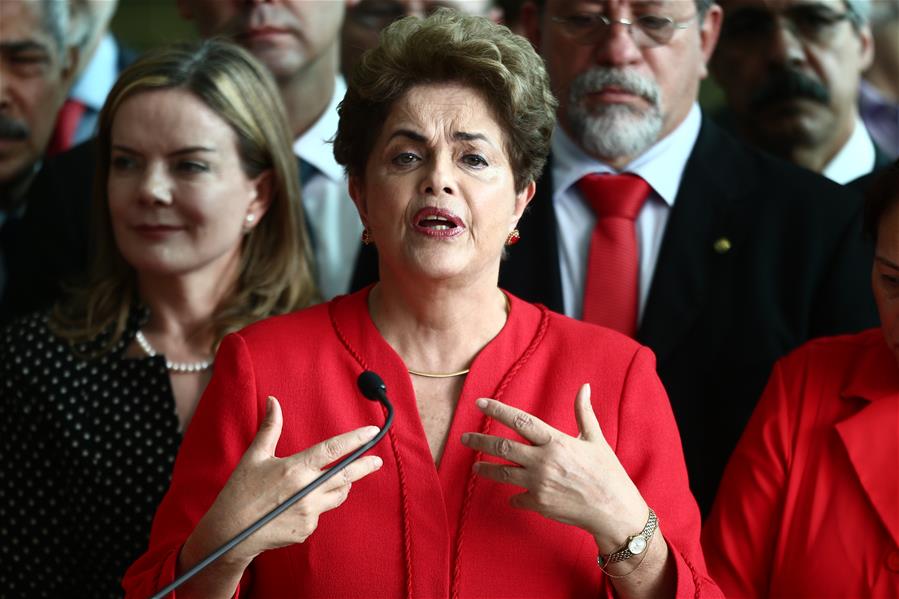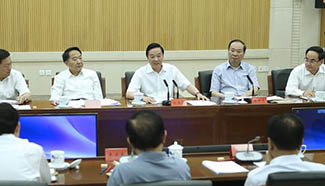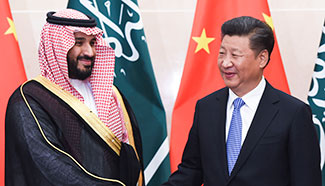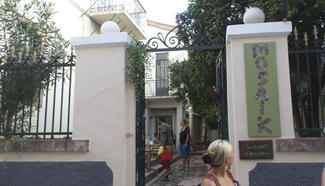
Dilma Rousseff delivers a statement at the Alvorada Palace in Brasilia, Brazil, on Aug. 31, 2016. The Brazilian Senate voted on Wednesday to strip Dilma Rousseff of the presidency by 61 votes in favor to 20 votes against. This means Rousseff is immediately and permanently removed from her role and Michel Temer, who assumed the interim presidency after Rousseff was suspended in May, will become president until the end of this term in 2018. (Xinhua/Wilton Junior/Agencia Estado)
BRASILIA, Aug. 31 (Xinhua) -- Brazilian President Dilma Rousseff was impeached by the Senate on Wednesday morning, with 61 votes supporting the impeachment and 20 votes against the move.
The following is a chronology of the nine-month impeachment process.
-- October 2014: The Workers' Party candidate Rousseff won reelection in a tightly contested runoff, defeating her conservative opponent Aecio Neves of the Brazilian Social Democracy Party (PSDB). However, her relatively slight lead led the opposition to contest the outcome. The electoral court confirmed Rousseff's win.
-- January 2015: Rousseff began her second four-year term by making concessions to the opposition, designating conservative economist Joaquim Levy finance minister. Levy cut public spending in a bid to address fiscal and economic challenges, much to the dismay of Rousseff's power base.
-- February 2015: Eduardo Cunha of the Brazilian Democratic Movement Party (PMDB) and an ally of Brazil's Vice President Michel Temer, was elected President of the Chamber of Deputies (the Lower House).
Maria das Gracas Silva Foster, president of the state-run oil company Petroleo Brasileno Sociedad Anonima (Petrobras), resigned following revelations of corruption uncovered by Operation Car Wash, an investigation into widespread graft involving company executives and lawmakers.
-- March 2015: Mass protests took place in the South American country's main cities against government corruption, and a campaign to impeach Rousseff started to take shape.
-- May 2015: The political group Free Brazil Movement filed for impeachment against Rousseff, submitting its case to Cunha, president of the Chamber of Deputies.
-- June 2015: Brazil's Federal Court of Accounts (TCU), which has the power to audit fiscal statements, asked the government with a deadline to explain delays in payments to state banks, or what was called "tax pedaling" or "fiscal pedaling."
-- July 2015: An informant for Operation Car Wash accused Cunha of receiving millions of reais (Brazil's currency) in bribes from Petrobras. Cunha announced his split from the government.
-- August 2015: Opinion polls showed 71 percent of those surveyed disapproved of Rousseff's government at a time when Brazil's economy was entering into a recession and anti-government demonstrations resurfaced. ' -- September 2015: The government made its case before the TCU, concluding there was no violation of Brazil's Fiscal Responsibility Law.
Standard and Poor's lowered its credit rating and Brazil lost its "investment grade" status.
-- October 2015: Rousseff restructured the coalition government with a new majority in Congress.
The TCU recommended Congress reject the government's explanations regarding tax pedaling and a group of lawyers presented a petition to impeach the president for fiscal irregularities.
-- Dec. 2, 2015: The ruling party faction in the Chamber of Deputies voted in favor of investigating Cunha for suspected corruption. Later the same day, Cunha authorized the lawyers' impeachment petition, officially starting the impeachment process against Rousseff.
The Federal Supreme Court (STF) outlined the steps Congress must follow and Vice President Temer delivered a letter to Rousseff confirming he would maintain "institutional" ties to the government.
-- Dec. 16, 2015: Finance Minister Levy stepped down. Brazil lost its "investment grade" status from credit rating agency Fitch.
-- March 4, 2016: Former Brazilian President Luiz Inacio Lula da Silva (2003-2010), Rousseff's mentor, was taken into police custody for questioning regarding the Petrobras case.
-- March 13, 2016: Mass anti-government protests fueled by the opposition called for impeachment.
-- March 17, 2016: The Chamber of Deputies formed a Special Commission to analyze the process.
-- March 18, 2016: Mass pro-government protests took place.
-- March 22, 2016: Rousseff claimed the impeachment process was in effect a "coup d'etat" to seize power.
-- March 29, 2016: Vice President Temer's political party, the PMDB, abandoned the government coalition, followed by other smaller parties.
-- April 12, 2016: The Chamber of Deputies' Special Commission recommended impeachment, citing "criminal responsibility" on the part of Rousseff.
-- April 17, 2016: The full Chamber of Deputies approved the impeachment process, and the proposal was passed to the Senate.
-- April 25, 2016: The Senate installed a Special Commission to analyze the impeachment case.
-- May 5, 2016: The Federal Supreme Court removed Cunha from his position for obstructing the investigation into his alleged corruption.
-- May 6, 2016: The Senate's Special Commission recommended the impeachment process to go ahead.
-- May 11, 2016: The Senate voted to hold an impeachment trial, and suspended the president for up to 180 days from office, during which the trial must take place. Vice President Temer took over the presidency on an interim basis.
-- June 6: The special Senate commission drew up an impeachment timetable.
-- June 8: A published poll showed 61 percent of Brazilians believed the impeachment process was "legitimate," and 50 percent supported early elections.
-- June 27: Senate investigators concluded Rousseff played no role in tampering with the fiscal accounts.
-- Aug. 2: Despite their findings, the special Senate commission's point man Antonio Anastasia claimed Rousseff "violated the Constitution."
-- Aug. 9: Anastasia's report was approved by a vote of 59 to 21 at the Senate, paving the way for the impeachment trial.
-- Aug. 25-26: The impeachment trial began, and witnesses for and against Rousseff were heard at the Senate.
-- Aug. 29: Rousseff was questioned by senators on charges of breaking budget laws. Rousseff denied any wrongdoing.
-- Aug. 31: Senators voted to out Rousseff.











